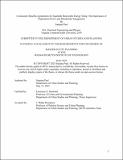Community Benefits Agreements for Equitable Renewable Energy Siting: The Importance of Negotiation Power and Stakeholder Engagement
Author(s)
Paul, Sanjana
DownloadThesis PDF (927.2Kb)
Advisor
Susskind, Lawrence E.
Terms of use
Metadata
Show full item recordAbstract
As renewable energy development accelerates across the United States, conflicts over project siting have become increasingly common; often rooted not in opposition to clean energy itself, but in concerns over fairness, community inclusion, and long-term accountability. This thesis investigates how Community Benefits Agreements (CBAs) can serve as tools to address these challenges, focusing on how negotiation dynamics, mediation, and stakeholder engagement shape the equity and enforceability of CBAs in renewable energy siting. Using a mixed-methods approach, this research draws on qualitative case studies, stakeholder interviews, and legal-policy analysis, alongside a limited quantitative assessment of CBA implementation outcomes. The study examines both the procedural and structural conditions that influence how benefits are negotiated, formalized, and monitored. By analyzing cases that include third-party facilitation, amendment mechanisms, and diverse stakeholder participation, the thesis identifies best practices for designing CBAs that move beyond performative engagement and toward genuine community empowerment. Ultimately, this research offers a multidimensional understanding of CBAs as emergent governance instruments situated at the intersection of infrastructure planning, environmental justice, and public accountability. It concludes by proposing a model state-level regulatory framework to support equitable CBA development and embed principles of justice into the future of renewable energy siting.
Date issued
2025-05Department
Massachusetts Institute of Technology. Department of Urban Studies and PlanningPublisher
Massachusetts Institute of Technology